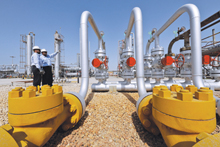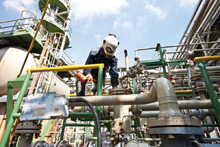
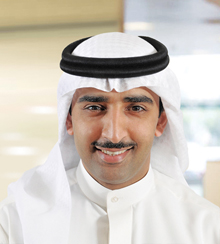 Sheikh Mohamed ... focusing on investments
Sheikh Mohamed ... focusing on investments
SHEIKH Mohamed Al Khalifa, chief executive of nogaholding is in confident mood as he surveys the oil, gas and petrochemicals sector of Bahrain and discusses investment, increasing value and creating business opportunities for the national economy.
nogaholding is the investment and development arm of Bahrain’s National Oil and Gas Authority (Noga), a decidedly business-focused company that seeks to create shareholder value by the management and growth of a portfolio of Bahrain’s shareholdings in oil, gas and petrochemicals assets.
The Oil and Gas Holding Company BSC (c) (nogaholding) was established and promulgated by Royal Decree in 2007 and plays a fundamental role in the execution of the strategic plans of Noga and the stewardship of the government’s investment in two wholly owned and six partly owned joint ventures.
These comprise the Bahrain Petroleum Company (Bapco), Bahrain National Gas Company (Banagas), Bahrain National Gas Expansion Company (BNGEC), Bahrain Aviation Fuelling Company (Bafco), Bahrain Lube Base Oil Company (BLBOC), Gulf Petrochemical Industries Company (GPIC), Tatweer Petroleum and Skaugen Gulf Petchem Carriers Company (SGPC).
“nogaholding is generally focused on investments that are strategic to the nation in order to provide meaningful employment, and be economic in terms of delivering a return on investment. We look at various models including build, operate and transfer and look at co-investment too,” says Sheikh Mohamed.
The portfolio mix of nogaholding assets has separate requirements depending on the shareholding stakes.
Bapco, for example, which is wholly owned by nogaholding, is looking ahead to the strategic expansion and modernisation of its facilities and securing long-term finance over the coming years.
It is very much full-speed ahead to continue on the Bapco modernisation programme (BMP) to improve competitiveness and deliver more value-added products to the international market. Engineering design bids are being examined and evaluated, the configurations examined and the product mix determined prior to signing off with the technology providers and engineering, procurement and construction (EPC) contractors.
Similarly, the Gulf Petrochemical Industries Company (GPIC), in which nogaholding has one-third share, is looking to build more capacity as part of its expansion programme, says Sheikh Mohamed.
GPIC produces ammonia, urea and methanol, key components for the global agriculture sector and nitrogen fertilisers, and their world trade volumes are expected to witness double-digit growth. Work on a project to expand the capacity of the GPIC plant at Sitra will provide fertiliser supply for the ever increasing global demand for food production, and yield a return on investment.
The A-B pipeline project between Bahrain and Saudi Arabia will have significant economic impact on the Bahrain economy. The new pipeline is set to increase crude capacity to 350,000 bpd with front end engineering design (Feed) expected to be finalised in the second quarter of 2014 with nogaholding involved with finance, according to Sheikh Mohamed.
For Tatweer Petroleum, in which nogaholding has a 20 per cent shareholding, the objective is to increase oil production and reserves largely through enhanced oil recovery strategies.
Following on from the refinery strategic investments which came on-stream in 2007, the Lube Base Oil Plant costing $430 million was commissioned in 2011, adding to the refinery configuration whilst diversifying its product range and producing higher value products at the refinery.
The $120-million Waste Water Treatment Plant to improve Bapco refinery’s environmental performance was recently commissioned. Regarding the development of the LNG import terminal, which is still under active discussion, Sheikh Mohamed emphasised the importance of a build, operate and transfer model for this strategic asset.
Noga is responsible for gas supply to the nation and nogaholding, as the investment arm of Noga, must ensure that Bahrain has secure liquefied natural gas supplies from any source worldwide.
“The import terminal is very much a strategic investment as well as an insurance policy for Bahrain in terms of a diversity of energy sources to meet future national demand and industrial growth,” concludes Sheikh Mohamed.



















































































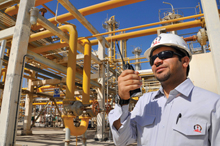
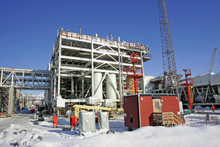
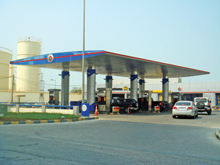
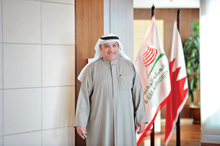
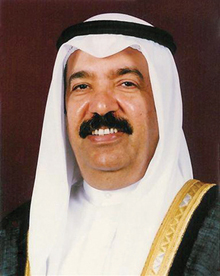
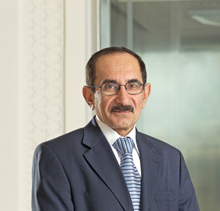
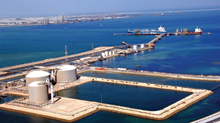

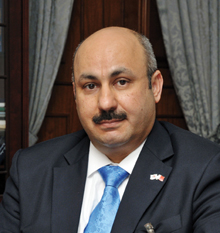
.jpg)
